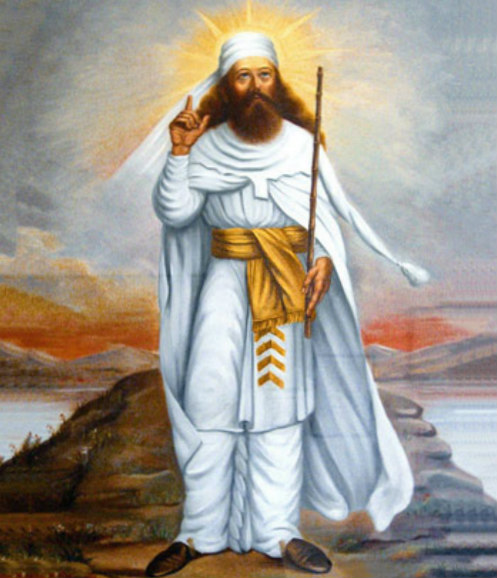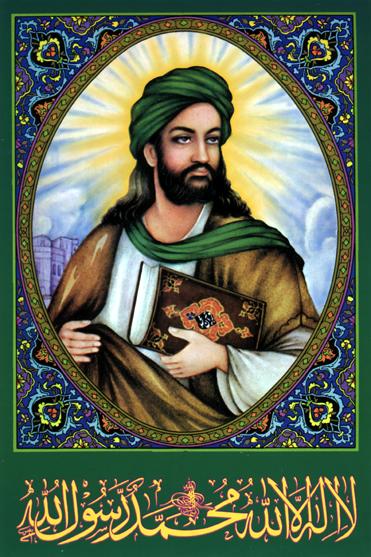Zarathustra or Zoroaster - The Primordial Master
Zarathustra or Zoroaster - The Primordial Master
Zarathustra (or Zoroaster) was the first prophet in his land to preach a monotheistic religion. He revealed that there is only one God, Ahura Mazda (Wise Lord), who is not humanised but represents the good, is all pervading, abstract and eternal.
His opponent Angra Mainya (the spirit of evil) does his best to avert humans' attention from the good, while his collaborator Spenta Mainyu (the Holy Ghost) can appear sometimes as an incarnation of the unique God and sometimes as a messenger of God's will.
Zarathustra was born in Persia (present Iran) in 630 BC. He was a very intelligent and energetic young boy and had the ability to see through the surface of things and penetrate the depth of their cause and meaning.
Zarathustra was born in Persia (present Iran) in 630 BC. He was a very intelligent and energetic young boy and had the ability to see through the surface of things and penetrate the depth of their cause and meaning.
When he was 30 years old he went to fetch some water from the river. As he went into the water Vohu Mana (the angel of the Good Mind) appeared to him and opened the portal to the Divine Light of Ahura Mazda. This was the first moment of Illumination and the first Revelation to Zarathustra.
Zarathustra began preaching in the capital of his country some years after the vision. The common people listened to him without great interest, while the priests and nobles rejected him harshly.
He tried many different techniques, but having met with such vehement opposition from the rulers and priests of his own land, he decided to leave for other countries with only 23 followers.
Zarathustra began preaching in the capital of his country some years after the vision. The common people listened to him without great interest, while the priests and nobles rejected him harshly.
He tried many different techniques, but having met with such vehement opposition from the rulers and priests of his own land, he decided to leave for other countries with only 23 followers.
After a number of unsuccessful journeys, they finally heard that the king of a nearby country a wise and just man, King Vishtaspa, might be open to new teachings.
Zarathustra was 42 when they finally reached the court of King Vishtaspa, who granted Zarathustra an audience. The King also invited all the priests and wise men of his court to attend as well. Zarathustra eloquently spoke and convincingly responded to all challenges and questions, gaining the trust of the King who embraced this new religion.
This was a major breakthrough for Zarathustra and from that day on he could freely go and propagate his teachings throughout this and the neighbouring lands.
Zarathustra's only works are songs, called the Gathas, that are part of the Avesta, the sacred text of Zoroastrianism. The Gathas are written in an ancient Avestan dialect that is a sister language to Sanskrit, Greek and Latin.
Zarathustra's only works are songs, called the Gathas, that are part of the Avesta, the sacred text of Zoroastrianism. The Gathas are written in an ancient Avestan dialect that is a sister language to Sanskrit, Greek and Latin.
Some of the verses of the Gathas are directly addressed to the Creator; other verses, from which some aspects of Zoroaster's life have been inferred, are semi-(auto)biographical, but all revolve around Zarathustra's mission to promote his view of the Truth.
Teachings -
“There is only one way to defeat the evil, that is by increasing the Good and only one way to remove the darkness, that is by diffusing the light”.
Here are a few excerpts from the Gathas, the holy songs of Zarathustra.
Love sincerely to receive love in reward
“Wise Lord, fulfill the desire of those whom you know to be just and earnest in righteousness and good mind to attain rewards. For I know, loving songs for a worthy purpose never go unanswered by You”.
Turn to Nature, hear God, and enjoy a good, progressive life
“I have always observed the principles of righteousness and good mind.
Wise God, teach me to speak the thoughts of Your mind, and the words of Your mouth: the teachings by which the pristine life shall be established”.
Promotion towards true happiness in mind and body, spirit and matter
“When shall Righteousness, Good Mind, and the Divine Dominion hasten to me? Wise One, do acknowledge, with Your discernment, the order of the Great Fellowship. God, help us now. We look to Your kindness.”
True happiness radiates happiness, enriches life
“May the Wise, Ruling-at-will God grant radiant happiness to the person who radiates happiness to any other person at large. I pray for steadfast strength and courage in order to uphold righteousness. Grant me through serenity the blessings of a rich life of good mind.”
Knowledge enlightens the way to Truth
“I realized You, God Wise, to be progressive when I was encircled by it through good mind. To its question: ‘For what purpose do you want to acquire knowledge?’ I said: ‘With the gift of homage to Your fire,
I shall meditate, as long as I can, in quest of righteousness.’”
Notes: Good Mind or Vohu Manah literally stands for ‘good mind, good thinking’, is the first of ‘Primal Principles of Life’. It stands for the ‘wisdom’ and clear thinking required for leading a righteous life.
Righteousness or Asha stands for ‘truth, order, righteousness’. It is the universal law of righteous precision. It may best be explained by stating that it means ‘to do the right thing, at the right time, in the right place, and with the right means in order to obtain the right result’.





Comments
Post a Comment